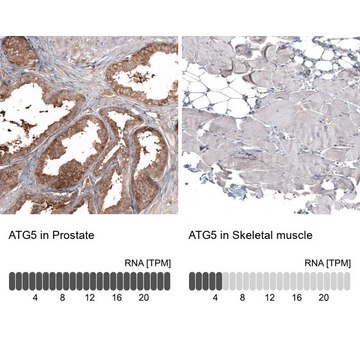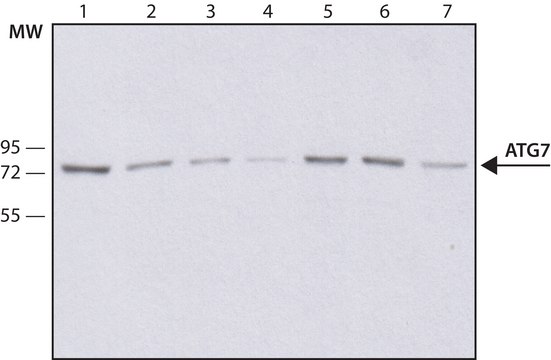A2859
Monoclonal Anti-ATG5 antibody produced in mouse
clone ATG5-18, purified immunoglobulin, buffered aqueous solution
Synonym(s):
Anti-APG5, Anti-APG5L, Anti-ASP, Anti-ATG5 autophagy related 5 homolog, Anti-hAPG5
Sign Into View Organizational & Contract Pricing
Select a Size
All Photos(3)
Select a Size
Change View
About This Item
Recommended Products
biological source
mouse
Quality Level
conjugate
unconjugated
antibody form
purified immunoglobulin
antibody product type
primary antibodies
clone
ATG5-18, monoclonal
form
buffered aqueous solution
mol wt
antigen ~56 kDa
species reactivity
human, mouse, rat
concentration
~1.0 mg/mL
General description
Monoclonal Anti-ATG5 (mouse IgG2a isotype) is derived from the hybridoma ATG5-18 produced by the fusion of mouse myeloma cells and splenocytes from BALB/c mice immunized with human Atg5, conjugated to keyhole limpet hemocyanin (KLH). The autophagy related 5 (ATG5) gene is mapped to human chromosome 6q21 and encodes a 32 kDa protein.
Specificity
Mouse monoclonal anti-ATG5 antibody reacts with human, rat, and mouse Atg5-Atg12 complex by immunoblotting (∼56kDa) and immunoprecipitation.
Application
Monoclonal Anti-ATG5 antibody produced in mouse has been used in western blotting and immunoprecipitation
Omegasomes were shown to localize to autophagosomes by immunohistochemistry using rabbit anti-ATG5 antibody.
Biochem/physiol Actions
Atg5 (also known as Apg5) is a 32kDa protein that is required for mediating autophagy. Studies have reported that the Atg12-Atg5-Atg16 complex localizes to autophagosome precursors and plays an important role in autophagosome formation. Furthermore, a fragment of Atg5 fragment produced by calpain cleavage is known to have pro-apoptotic properties.
Autophagy related 5 (ATG5), also known as Apg5, is essential for autophagy, a major pathway for bulk degradation of cytoplasmic constituents and organelles. In this process, portions of the cytoplasm are sequestered into double membrane vesicles, the autophagosomes, and subsequently delivered to the lysosome for degradation and recycling. Autophagy is required for normal turnover of cellular components during starvation. It plays an essential role in cellular differentiation, cell death and aging. Defective autophagy may contribute to certain human diseases such as cancer, neurodegenerative diseases, muscular disorders and pathogen infections. Autophagy is an evolutionary conserved pathway seen in all eukaryotic cells.
Physical form
Solution in 0.01 M phosphate buffered saline, pH 7.4, containing 15 mM sodium azide.
Disclaimer
Unless otherwise stated in our catalog or other company documentation accompanying the product(s), our products are intended for research use only and are not to be used for any other purpose, which includes but is not limited to, unauthorized commercial uses, in vitro diagnostic uses, ex vivo or in vivo therapeutic uses or any type of consumption or application to humans or animals.
Not finding the right product?
Try our Product Selector Tool.
recommended
Product No.
Description
Pricing
Storage Class
10 - Combustible liquids
wgk_germany
WGK 2
flash_point_f
Not applicable
flash_point_c
Not applicable
Choose from one of the most recent versions:
Already Own This Product?
Find documentation for the products that you have recently purchased in the Document Library.
Our team of scientists has experience in all areas of research including Life Science, Material Science, Chemical Synthesis, Chromatography, Analytical and many others.
Contact Technical Service







